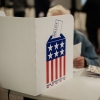A crowd chants “Stop the count!” and pounds on the windows and doors after partisan election challengers were told that the capacity for election challengers had been met in the counting facility at what was then Detroit’s TCF Center on Nov. 4, 2020.
Elaine Cromie/Getty Images
hide caption
toggle caption
Elaine Cromie/Getty Images
DETROIT — In 2020, what was then called the TCF Center became a tinderbox as Detroit poll workers counted the presidential election results.
A crowd of Republican observers at the center grew increasingly angry as false rumors of voting fraud spread across social media.
Now, four years later, Detroit election officials say they’re determined to avoid a repeat of the chaos that engulfed poll workers.
Fraud claims lit a chaotic fuse
The scene became a centerpiece of Donald Trump’s false narrative that the 2020 election was rigged against him.
“In Detroit there were hours of unexplained delay in delivering many of the votes for counting,” he said then. “The final batch did not arrive until 4 in the morning. And nobody knew where they came from.”
But officials in charge of tabulating those election results counter that no one asked at the time why those ballots arrived so late.

Detroit Elections Department Chief Operating Officer Daniel Baxter says he could have supplied the answer. He supervised poll workers who had to wade through more than 170,000 absentee ballots — about two-thirds of all the votes cast in the city.
“You gotta remember we were in the middle of the pandemic. Nobody wanted to go to the polls on Election Day, so they opted to vote by absentee,” Baxter said. “And some of them were a little slower than others in terms of getting them delivered. And that is exactly what you experienced at 3 o’clock, 4 o’clock in the morning.”
But as the vote-counting wore on, the situation deteriorated. Hundreds of people converged on the convention center. It escalated when the hall reached full capacity and certain challengers were ordered to leave.
“I heard banging on the windows,” Baxter recalled. “I heard chanting, ‘Stop the count! Stop the count!’ It was a hairy moment.”
Baxter said it was hard for those counting votes to keep from being distracted. And then things got worse.
“Someone made the bad call of putting cardboard up on the windows. When I discovered that I made sure it was removed,” he said. “I got on the microphone and explained to our staff, all of our poll workers, that we were not going to stop counting until the last ballot was delivered here.”

What’s changed for the 2024 election
After the near riot, those who game-planned for the next presidential contest hardened their resolve to protect poll workers, says City Clerk Janice Winfrey, who oversees all of Detroit’s elections.
“We got through 2020 when all of that happened, the threats and the hurling insults at election workers. And it wasn’t expected. So now we know that may happen and we are ready if it should happen,” Winfrey said.
That includes new security procedures designed to block any Election Day upheavals at what is now called Huntington Place.
Officials moved the central polling location to the enclosed, cavernous Hall A, on the opposite end of the center from where votes were tallied in 2020.
Baxter says there won’t be any banging on windows at Hall A.
“There’s no windows. And if you do not have credentials you cannot be inside in any area. Those folk who decide to be present for protests or whatever, the Detroit Police Department has designated an area where they can be.”


Baxter says the new location is also a smaller and more secure space than its 2020 counterpart.
He says it’s usable because Michigan now allows Detroit to tabulate absentee ballots more than a week ahead of Election Day.
That means fewer workers are needed for each shift because the vote-counting is spread across numerous days.
“We only have 50 tables for processing. In 2020 we had 134 tables. That made for more people, more challengers, more poll workers,” Baxter said. “Now at the table you have 300 ballots that you have to process, versus 3,000 ballots in 2020.”
There are also magnetometers guarding the doorways. Media, poll workers and challengers must swipe a driver’s card, state ID or some other form of identification to get credentials.
And Baxter says officials will keep track of how many people get in.
“A digitized check-in system will contain a maximum number for each group and organization,” he said. “Once we max out on that number no one will be allowed entry, whether it’s the Democratic Party, the Republican Party, the NAACP, the League of Women Voters or whoever they are.”
The need to harden infrastructure as well as resolve became glaringly apparent in 2022.
Winfrey, the city clerk, notes there was an incident at a building roughly 4 miles away from Huntington Place, where a GOP challenger confronted a deputy clerk in an alley behind the Elections Department.
“All of our windows on the first floor of our building has been replaced with bulletproof glass,” Winfrey said. “We have uniformed and plain-clothed officers. And the alleyway is now blocked off.”
Winfrey and Baxter estimate with early voting this year, workers will tabulate about 90% of Detroit’s ballots by early evening on Election Day.
That means poll workers should be able to leave the convention center much earlier than in 2020, shielding them, officials hope, from any disruptions by angry poll challengers.



